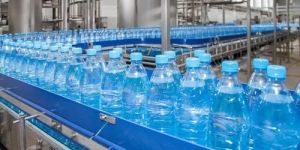
Packaged Drinking Water Plant
3,000,000 - 4,400,000 Per piece
30 bpm , 40 bpm, 60 bpm this is semi automatic mineral water plant starting from 2000 ltr capacity

Carbonator Machine
Get Price Quote
1 Piece (MOQ)
Best Deals from Beverage Making Plant
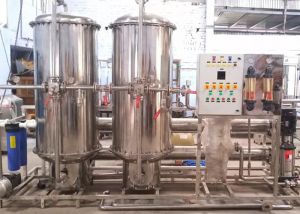
Packaged Drinking Water Plant
200,000 - 2,000,000 Per piece
1 Plant (MOQ)
We are one of the leading Manufacturers, Suppliers, Traders and Distributors, of this highly commendable range of Packaged Drinking Water Plant Product Description HALEY CIBUS PVT. LTD. is one of the leading Exporters & Manufacturers and suppliers of Packaged Drinking Water Plant. During our journey, we have collaborated with only the best brands and renowned manufacturers for all our plants and machineries parts and equipment’s. All the materials sourced for setting up these plants are of high quality and requires minimum maintenance. At every stage of water purification, we try to ensure that the source water meets the best water treatment processes and phenomenon. So that water can be treated in the best possible manner and people can get pure mineral water which they can rely upon anytime. This is why clients completely rely on us for their mineral water projects, due to the efficient procedures we use. Our highly functional mineral water plants are capable of handling water capacity ranging from 2000 liter/hr to 25,000 liter/hr. Our plants are made of SS 304, SS 316 & FRP which is an economical solution for the mineral water industry. Key Features 16 Years of Experience Own Manufacturing facilities Dedicated team of Engineers Highly Efficient Energy Saving Design Low Operating & Maintenance Cost Equipped with suitable Pre-Treatment with High Quality Components

Lab Scale Fermenter
1 Per Set
10 Set (MOQ)

Industrial Drinking Water Plant
500,000 Per Piece
1 Piece (MOQ)

Amla Processing Plant
75,000 Per Piece
1 Piece (MOQ)

Automatic Drinking Water Bottling Plant
Get Price Quote
1 Piece (MOQ)
Bottle Filling Machine Brief On Machine The Premium Filling System consists of main structure, material transfer pump, product transmission belt with adjustable guide, material storage tank, Safety acrylic cover, pneumatic priming & stopping facility, filling pump, isolated transformer, electrical panel, motor, PLC & HMI,AC drive & storage tank. The special HIGH / LOW liquid level indication in the tank is an added advantage. Salient Features of Premium Bottle Filling Machine The unit is made compact & versatile as per GMP norms The structure is made of MS cladding with SS 304 Rigid vibration free construction for trouble free performance The contact parts such as filling nozzle, filling pump are made of SS 316 L The Excel Filtration are used for the filling purpose Easy to clean the base of the machine The machine is supplied with easy to clean inbuilt storage tank The storage tank is connected with the high capacity of material transfer pump The storage tank is automatically controlled by the mean of float (Level) sensors The process of priming, diving and blocking of the products done by pneumatic (air) operated cylinder The Air pressure indicator attached with the machine to indicate the fault of low pressure of air supply There is special feature called "PRIME" which is useful to suck the filling material from storage tank to nozzle end very quickly. More over this facility is useful to clean filling line (Silicon tubes) as well as filling pump The machine has a facility of using for all the pumps together or individual pumps also Easy to operate PLC for any kind of filling volume adjustment
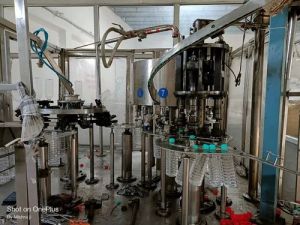
Packaged Drinking Water Plant
3,100,000 Per piece
1 Unit (MOQ)

Mineral Water Treatment Plant For Food & Beverage Industry
Get Price Quote
The clients can rest assured for their payment, as our payment procedures are safe, easy to use and make hassle free transactions. Obtain quality-grade Mineral Water Treatment Plant For Food & Beverage Industry from us at reasonable prices, as we are reckoned among renowned suppliers of the product. Water treatment solutions to meet the specific requirement of the AGRI-FOOD Industry: Preservation of water resources Guaranteed supply of process water Controlling product health risks Flexibility of water treatment installations Ensuring the reliability of physicochemical treatment Elimination of C, N, P and COD pollution Ensuring biological effluent treatment plants operate at optimum efficiency Treatment of fats Recycling of sludge Management of odour problems Reduction of energy consumption We have a complete range of water treatment solutions for the production of demineralised water, a raw material in the production of agri-food products (dairy products, drinks, etc.); the production of process water and steam; and the treatment of effluent and odour management.The production of demineralised water, process water and steam : By ultrafiltration for treated water of consistent quality, By reverse osmosis to reduce consumption of chemical reagents By coupling of ultrafiltration with reverse osmosis By denitrification to reduce resin volumes needed and to ensure protection of the distribution networks Effluent treatment of effluent and sludge recycling: By a physical/chemical finishing process, for the reduction of suspended matter and phosphorus By a biological process for complex effluents, before discharge into a highly sensitive natural environment By MBR, to eliminate COD, nitrogen, carbon, phosphorus and suspended solids By a methanisation process to make use of the energy contained in sludge By odour management in order to avoid offensive odours Furthermore, we offer a full range of services that cover complete operation of your water treatment installations, maintenance, technical assistance and the leasing of mobile water treatment units to meet any temporary requirements (emergencies, maintenance, etc.). In France, we offers an off-site effluent treatment solution to respond to an increase in your production, the launch of a new product, etc.

Drinking Water Treatment Plant
300,000 Per Piece
1 Piece (MOQ)
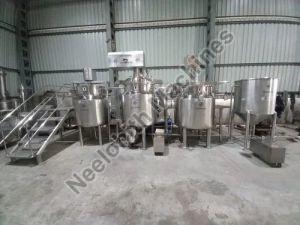
Fruit Juice Processing Plant
5,500,000 Per Unit
1 Unit (MOQ)

drink mixers
Get Price Quote
We are Drink Mixer,Beverage Mixer,Beverage Mixer,Cocktail Shakers Manufacturer Supplier in India.CoolStar Food Processing Machines Offered by us is an exclusive range of Food Processing Machines that is offered to customers as per their requirements. These products are procured from reliable market vendors to ensure that the customers are offered with only qualitative products. In addition, these are highly appreciated in the industry for their low maintenance, corrosion resistance and user-friendliness. These products are offered at cost-effective rates to customers. This range of drink mixers is responsible for automatically sealingvarious sizes of cylinder-type bottles. With ease in use, reliability in performance and low maintenance these machines provide aluminum theft proof capsules. These equipment are broadly used in automatic packing lines of mineral water, food, pesticides and drinks. This machine is with single head capper and six working places. PRODUCT FEATURES: 900 cc stainless steel cup on 120 W versions Powerful ventilated motor for a longer life Spindle with three aluminium and steel agitators for preparing cocktails and drinks Offered with a special round agitator for frozen coffees or for creamier results PRODUCT SPECIFICATIONS: Gross weight Kg 3 , 5 Power source 230V 50/60HzF + N

Beverage Mixer
6,500 Per Piece

Brewery Equipment
Get Price Quote
We provide a wide gamut of high quality Brewery Plant And Equipment that includes Fermentors, Unitank, Caustic Tanks, B.B.T etc. We have firmly positioned ourselves as one of the major Brewery Equipment Manufacturers, based in India. Our Microbrewery Equipment is manufactured from the 300 Grade Stainless Steel to add durability and efficacy. Available in various sizes and dimensions, our Microbrewery Equipment can be customized as per the demand of the client. Our Microbrewery Equipment is well known for inner & outer surface finishing, easy installation and long lasting excellent performance. We offer Microbrewery Equipment at reasonable prices and that too at a very brisk pace. Equipments : Fermentors, Unitank, Caustic Tanks, B.B.T. MOC (Material of Construction) : 300 Grade Stainless Steel. Design Codes : Custom Designed. Internal Surface Finish : 0.85 Ra (Micron). External Surface Finish : 1.45 Ra (Micron).

Soft Drinks Bottling Plant
1,500,000 Per Piece
1 Piece (MOQ)

Roasted Protein Mix
555 - 750 Per kg
25 Kilogram (MOQ)

carbonated soft drink plant
1,125,000 Per Piece
1 Piece (MOQ)
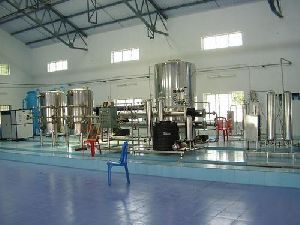
Packaged Drinking Water Plant
Get Price Quote
BASIS OF DESIGN AND CAPACITYOBJECT:To commission a Mineral water plant 3000 liters per hour.ASSUMPTIONS:No. Of working days :360 daysNo. Of working hours :10-16 hoursCapacity utilization :91-95%INPUTS (Raw water Quality):Total Dissolved Solids : < 1500 PPMOUTPUT (Treated Water Quality):Total Dissolved Solids : < 50 PPMFINAL OUTPUT TDS : As Per requirement

Drinking Water Treatment Plant
325,000 Per Piece
1 Piece (MOQ)

Carbonated Soft Drink Bottling Plant
3,500,000 - 20,000,000 Per Piece

chemical processing plant
Get Price Quote
We are offering chemical processing plant. This is a versatile unit and can be used as reaction distillation unit, fractional distillation unit or a combination of both. All features of reaction distillation unit and fractional distillation unit are incorporated. The unit is available in vessel size of 20, 50, 100, 200, 300, 500 ltr. And is suitable for operation under atmospheric pressure and full vacuum.

Beverages Intermix
30,000 Per Piece
1 Piece(s) (MOQ)

Fermenter Tanks
Get Price Quote
Our team professionals ensure that smooth transactions are done and for that reason, we accept payments through letter of credit & money transfer. This makes us most reliable amidst the clients. We have installed a large storage facility wherein we keep a large stock of the offerings. This facility helps us in keeping the entire lot away from the damaging factors like moisture, sunlight, dust, rain, etc. Product Details : Low maintenance Light weight Flawlessly finished Rugged Compact design Excellent finish
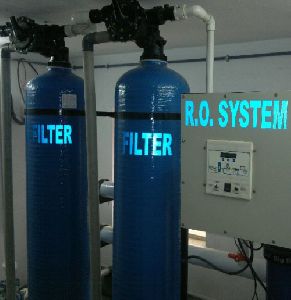
Drinking Water Treatment Plant
125,000 - 1,250,000 Per Set
1 Set (MOQ)

Dairy Food Beverage Plant
Get Price Quote
1 piece (MOQ)
SUNMAN in association with its supporting manufacturers, supported by reputed consultants and experienced oil technologists, offer the state of art equipment & plant from concept to Commissioning: Milk Processing Plant Curd, Yogurt, Ice Cream Plants Soft Drink & Juice Processing
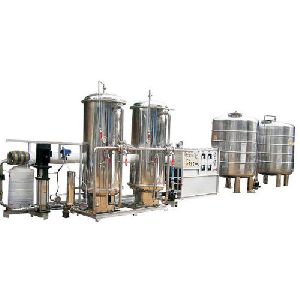
Packaged Drinking Water Treatment Plant
1,150,000 Per Piece
1 Piece (MOQ)

Hind Cola Carbonated Soft Drink
Get Price Quote
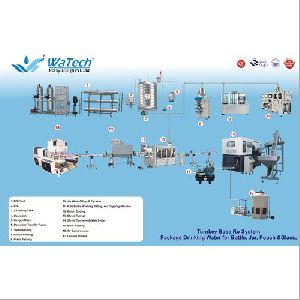
Packaged Drinking Water Plant
1,500,000 Per Set
1 Set (MOQ)
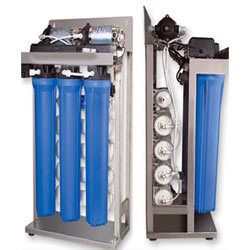
Packaged Drinking Water Plant
50,000 - 1,000,000 Per
1 Piece (MOQ)
It is Reverse Osmosis ( RO) Plant. Its manufactured by quality equipments.Its capacity is: 250 LPH -10000 LPH.Mostly Use : Packaged Drinking water Project, 20 Ltrs Bottling plants etc.

Packaged Drinking Water Treatment Plant
350,000 Per Piece
1 Piece (MOQ)